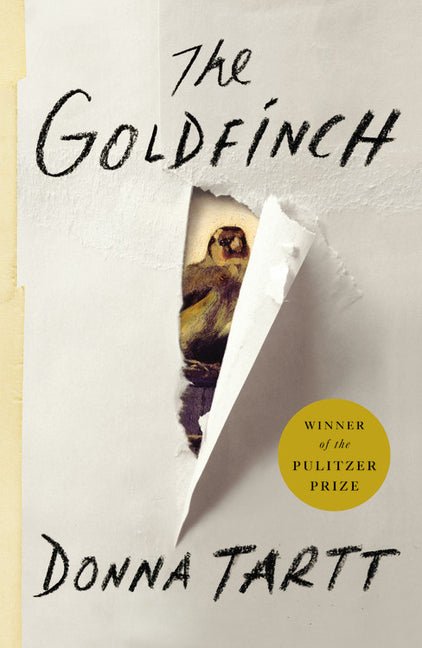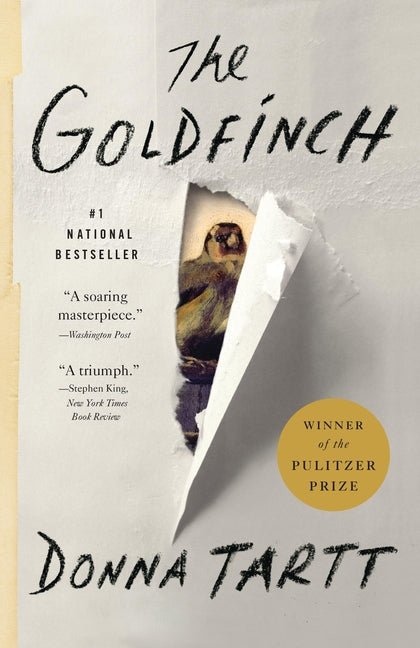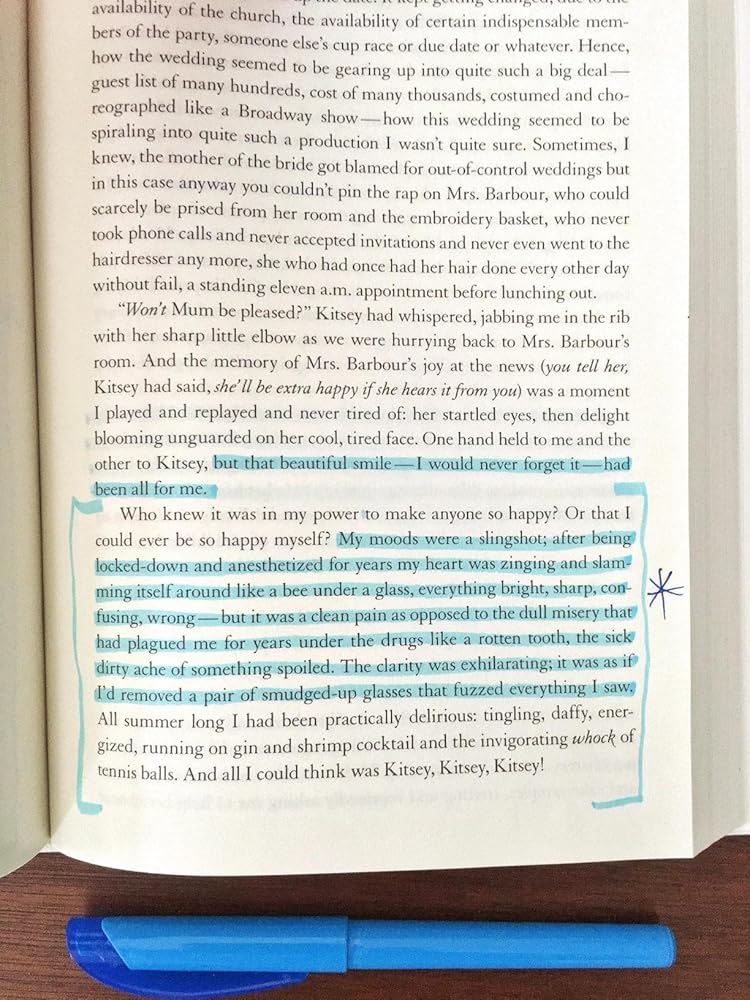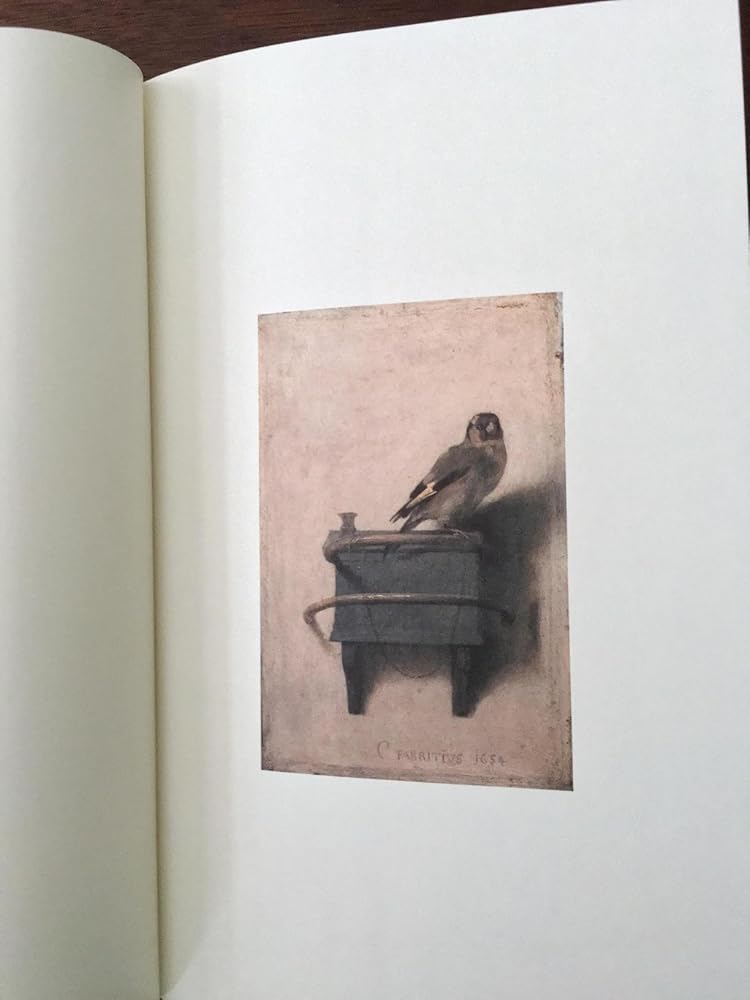The Goldfinch
by Donna Tartt
*When you open this audiobook on Libro.fm, be sure to select Aveson as your bookstore so that your purchase supports local literacy programs and tree‑planting.
Couldn't load pickup availability
A young New Yorker grieving his mother's death is pulled into a gritty underworld of art and wealth in this "extraordinary" and beloved Pulitzer Prize winner from the author of The Secret History that "connects with the heart as well as the mind" (Stephen King, New York Times Book Review).
Theo Decker, a 13-year-old New Yorker, miraculously survives an accident that kills his mother. Abandoned by his father, Theo is taken in by the family of a wealthy friend. Bewildered by his strange new home on Park Avenue, disturbed by schoolmates who don't know how to talk to him, and tormented above all by a longing for his mother, he clings to the one thing that reminds him of her: a small, mysteriously captivating painting that ultimately draws Theo into a wealthy and insular art community.
As an adult, Theo moves silkily between the drawing rooms of the rich and the dusty labyrinth of an antiques store where he works. He is alienated and in love -- and at the center of a narrowing, ever more dangerous circle.
The Goldfinch is a mesmerizing, stay-up-all-night and tell-all-your-friends triumph, an old-fashioned story of loss and obsession, survival and self-invention. From the streets of New York to the dark corners of the art underworld, this "soaring masterpiece" examines the devastating impact of grief and the ruthless machinations of fate (Ron Charles, Washington Post).
Share
Book Details
ISBN:
9780316055437
EAN:
9780316055437
Binding:
Hardcover
Pages:
784
Authors:
Donna Tartt
Publisher:
Little Brown and Company


I’m sure it’s a great book, but I never got to read it because it fell apart on me. I purchased the paper back and it came with a few of the front pages slightly ripped of the spine, as I read more and more ripped until they eventually fell off, I gave up trying to read the book since I had to care for it like it was the book ever printed.
From the first page, I could not put this book down. Brilliant. Even though there is a lot of extra description and peripheral info and musings it's all so very well written that it, too, kept me devouring this enormous feast of a book. The author's insights and spot-on looks at life and human character and relationships had me wanting to take pictures of pages and paragraphs to show friends this great writing, like, well, like a painting, like isn't this a magnificent painting. In the hands of a less-talented author all the extra ramblings would have led me to abandon this tome early on. Nope. I was riveted. Partly I was eager to see what would happen next and partly I was just enjoying the ride. I will add, though, that it really dragged at the end. Once Theo and Boris left the engagement party and flew to Amsterdam, it really dragged and I lost interest. I skimmed and skipped through the last 50-100 pages and it never picked up again. Then the ending was just .... flat. It just kind of ended with no dramatic or satisfying wrap-up. It was a disappointment but the rest of it was so good I still give this 5 stars and highly recommend it. Also, I wish Theo wasn't such a druggie and drinker. Ok I get some of that but it was too much.
Donna Tartt’s The Goldfinch had been buried somewhere in the nether reaches of my “wishlist” for some time but rocketed to the top with the theatrical release of the eponymously named movie, and I just finished reading it. I am at a loss to explain exactly why I loved this book, but love it I did. In the three weeks that it took me to read it, I couldn’t put it down. I can’t say that it was “suspenseful” (although parts of it were, to be sure) – and “suspense” is certainly not its genre - but nevertheless I found it an utterly compelling reading experience, sometimes “dark” perhaps, but always provocative and engaging.In a nutshell it describes a series of circuitous events over the course of a number of years for a young boy, Theo Decker, whose life is forever changed by the sudden death of his mother in a terrorist explosion at a New York museum. At the urging of a dying man (Welton "Welty" Blackwell), and commencing a strange turn of events, Theo steals (saves?) a famous painting, the titular “Goldfinch,” from the museum exhibit before it can go up in flames and that painting steers his course in life. I have to say a stolen painting is a unique plot device to form the centerpiece of such an epic story, but nevertheless this story revolves around this very artifact. The “taking” of the painting is the pivotal event in Theo’s story.After this watershed event in his young life, the now motherless boy is taken in by the wealthy high-society family of a schoolfriend, the Barbours; then finds himself in Las Vegas living with his wayward father and his flaky girlfriend (this is where he meets his shady friend Boris, who will come to play a more significant role in his life); and then returns (flees, actually) back to New York, where the painting basically leads him to the doorstep of the kindly James Hobart, or “Hobie,” a restorer of antique furniture, who takes in the now orphaned boy and ultimately makes him his business partner. It is also at Hobie’s house that he meets up once again with Pippa, the intriguing wan little girl whom he first spies in the museum before the explosion and with whom he instantly falls in love.Ms. Tartt’s opus has been described as “Dickensian” and, while it has been many years since I’ve read anything by that author, the epic scope of The Goldfinch makes me concur with the comparison. The Goldfinch is peopled with the most colorful and impeccably etched characters, some likeable (Hobie, Mrs. Barbour), others not so much (the villainous Lucius Reeve). (Where the enigmatic Boris fits on this spectrum is up for debate, and in fact the very same can be said for the protagonist himself.) Even the spritely little dog Popper/”Popchick” comes to life in the pages of this book.One of the things that struck me so much about this story was the description of the inner life of the main character. I was deeply moved by some of the passages relating his sense of loss and bereavement over his mother, who it seemed to him was the only person who ever really loved him. There is one passage late in the book, describing a dream sequence where his mother is presented as being just out of reach, with which I believe only someone who has experienced deep loss can truly identify. In terms of capturing a character’s inner life, the only other author I can think of who approaches this level of mastery is Khaled Hosseini.Ms. Tartt’s text is a hybrid between prose and poetry. Her spot-on descriptions of place and inner life are such that only poetry could do them justice. I was extremely impressed by her deft descriptions of place; her writing is thoroughly evocative in this regard. She is not only a poet but a painter of scenery using the medium of words. Being a New Yorker, I was particularly impressed with her descriptions of the quaintness of the West Village, but I was equally impressed with her description of the desolate nature of the new housing development where Theo lived briefly with his father out in Las Vegas. In my mind’s eye, I could oh-so-clearly picture these locales owing to the skill of the author in describing them.Reading some of the other reviews, it seems most people either love or hate this book. Consider me firmly in the former camp. I found that reading this story was a thoroughly immersive experience, and although I can’t quite put my finger on why, even a transformative one.I am not surprised that this novel won a Pulitzer prize; it is definitely an “important” work. (And Donna Tartt is definitely an important novelist.) I am greatly looking forward to the movie to see how the challenge is met of translating all of these finely drawn characters to the big screen.
Winner of the Pulitzer Prize for fiction. 784 pages long. Massively polarized reaction. A final section that's known to be somewhat explicit about spelling out all the themes of the book. All of those things sort of worked together to keep me from reading Donna Tartt's The Goldfinch for a long time, as much out of intimidation as anything. And yet, within a few pages, I was completely hooked into the novel, flying through it over the next few days compulsively. Yes, The Goldfinch is a massive book, but it's one of those books that wears its length effortlessly, spinning a wonderful story that draws you along and leaves you ready for more even when you're done.It doesn't hurt that The Goldfinch starts off so propulsively. 13-year-old Theo Decker is in the Metropolitan Museum of Art with his mother (Theo's sole parent) when an explosion triggers two events that will shape the rest of his life: the death of his mother and the theft (more or less - it's complicated) of a Dutch painting that gives the book its title. Left on his own, Theo finds himself adopted first by the upper class family of a friend, then dealing with the re-emergence of his absent father, then...well, suffice to say, The Goldfinch covers much of Theo's life, from the explosion to the end of the saga of the painting decades later, across multiple cities, families, homes, relationships, run-ins with criminals, scams, drug habits, and so much more. In other words, this is a sprawling book, one that's as much about Theo's journey through life as it is a stolen painting. But in the hands of author Donna Tartt, The Goldfinch never feels shaggy, overlong, or excessive. Rather, it pulls you along, investing you in every character along the way, from Theo's brilliant but socially awkward friend Andy to Andy's forbidding, outwardly cold mother, from his father's new love interest to a charming Jewish gangster. But really, the heart of the book comes down to Theo and his best friend over the course of the novel, Boris Pavlikovsky. That friendship drives so much of the book, and it's the source of so much of the novel's depth, warmth, and personality. Boris is undeniably larger than life, and his charm lets his, shall we say, loose relationship with morality somehow never turn you off, and instead, simply make him more fun to read about, even if you don't know that you'd want to have him in your life. (The comparison within the novel to the Artful Dodger is a completely earned one.) But really, the novel comes down to Theo Decker, a damaged young man haunted by the loss of his mother and trying to figure out a place in the world while constantly finding that same world pushing him down. This is a novel about trauma, and why bad things happen, and if art can help us deal with that, and the meaning of family, and so many other things - all of which undeniably comes out in that final monologue, which tries to find meaning in all of the novel's events. But rather than feeling like an exposition dump or a lazy bit of telling instead of showing, that soliloquy feels earned, giving us a sense of Theo as he tries to make sense of his life and find meaning in senseless death, human frailty, and unfairness in the world. Tartt doesn't shy away from any of this; even though The Goldfinch feels engaging and warm, due to her affection for her characters and especially Boris's anarchic sensibility, it's undeniably a book that deals with depression and pain, and doesn't shy away from the fact that life doesn't always go how we want - and it admits that it has no answers for that, either.In other words, this is a book not just about one boy's effort to deal with a traumatic event, or the complicated saga of a stolen painting, but about life in general: how we define ourselves through other people, how art influences us and helps us cope with reality, whether good results can come out of immoral acts, how we hide from our own shame - that is, questions we all deal with over and over again. That it does so while telling a rich, detailed, and engaging life story, and one that feels like it covers melodrama, crime thriller, slight comedy, coming of age, romance, and so much more, all while never shying away from big ideas or difficult questions...well, it's truly something remarkable and amazing. And if it's not "literary" enough for some people because of some of those genre elements, so be it. But for me, when I was finished with it, all of those worries I had at the beginning melted away, and all I could think was how much I loved living in this book, and how much more I could have read without ever getting bored.
I loved Donna Tartt's 'The Goldfinch'. It is a novel I had anticipated reading for a long time, one which I had extremely high expectations for. I expected it to knock my socks off, and it did. From early on in my reading, it was immediately apparent that this was no doubt Tartt's magnum opus, proven by the fact that it garnered her the richly deserved Pulitzer Prize for fiction in 2014.With all that said, I must divide the novel's quality into two unequal parts: every plot development before the character of Boris was introduced is stellar, superb! Every plot development after the character of Boris was introduced and Boris was present for, was the one reason where this excellent novel almost became 4-Stars. The writing alone is 5-stars quality, but I despised Boris so much, he almost spoiled the book for me at certain parts.Tartt's writing is exceptional, and emotions, raw and deep, resonate off every page. From the crisp, rhythmic opening scene in Amsterdam, to Theo's mother illuminating up off the page, my literary senses perked up from page one and were always fully engaged. The story has a breezy yet sophisticated charm to it, with laugh out loud humor intermixed with sobering adult themes. From the precocious observances of a young Theo and Andy, to the jaded but wise adults, - I found laughs aplenty. There is of course plenty seriousness, but Tartt expertly softens it with occasional jest. This dual combination works terrifically, making for a spirited reading experience.Because the story of Theo, the boy who comes in possession of a Dutch Golden Age painting, the titular Goldfinch, is a bildungsroman, it became clear that there were Dickensian motifs peppered throughout the novel. Sometimes it is subtle, other times it is overt, with heavy allusions to 'Oliver Twist' and 'Great Expectations'. At any given time, it felt to me that Theo is a composite of Oliver Twist and Philip Pirrip (Pip), Boris is a composite of the Artful Dodger and Bill Sykes, Hobie is a composite of Mr. Brownlow and Joe Gargery, Mrs. Barbour is Miss Havisham, Pippa is Biddy and sometimes Estella, Kitsey is mostly Estella, and so on. Or at least that's how I interpreted the correlation between Tartt's characterizations and Dickens'. Tartt's use of the Dickensian motif is done well as it felt like a respectful homage, rather than a copy. The effect is never gimmicky or contrived, but is rather seamless.As with many tales by Dickens, Tartt also gives us the bitter along with the sweet in the story of a young boy coming of age and finding meaning to his lfe. I appreciated the complex, angel/devil characterization she gave Theo, with multiple unsavory character traits and dubious actions. Lessons abound where in Theo's coming of age trek through his early life, he becomes a source of frustration for me the reader. The ostensibly bright, once thoughtful, and spirited young Theo detours down a questionable path. This is where the character of Boris comes in, leading me to dislike him immensely. As I read Theo's story, especially as he spiraled into debauchery and delinquency in Las Vegas, I could foretell the inevitable results of his stupid choices, choices mostly instigated by Boris. Unquestionably, fate dealt Theo a tough blow, but he himself makes no effort to go against the grain. He instead allows Boris to influence him. This turns to be a frustrating character development in Theo, but one that is stirring, nonetheless.As we know of all Dickensian tales, Tartt also takes us through Theo's entire journey, ultimately ending at the cusp of his self-awareness, acceptance, and redemption. I must admit, It is hard to root for a drug using, love pining, art swindling rogue with dubious criminal tendencies. But yes, I was rooting for Theo the whole way. The beauty of it all being that for him to come out the other side, he had to discover the dirty parts of himself and the dark aspects of humanity. I thought Tartt did a wonderful job juxtaposing the two dualities. We're all saints and sinners in our own lives.Lastly, unlike other readers, I did not mind the novel's length at all. As a matter of fact, I reveled in it. For me personally, as long as the themes and characterizations are sharp and taut throughout, the longer the better. Other than hating Boris' character, and disliking the delinquent time spent in Las Vegas, one other aspect I would have liked to be different was the tone of Theo's philosophizing towards the end. His waxing poetic was a beautiful act of contrition, and self-awareness. However, it did seem much too profound for someone so young as he. Not necessarily with additional plot, but I wished Tartt had aged him into his 30s or 40s by the book's close when he came to all his personal conclusions. His self actualization of his fate felt more like something someone older would have come to realize, years after living life. Rather than from him at age 27. His philosophizing did work, but coming from someone as young a...





